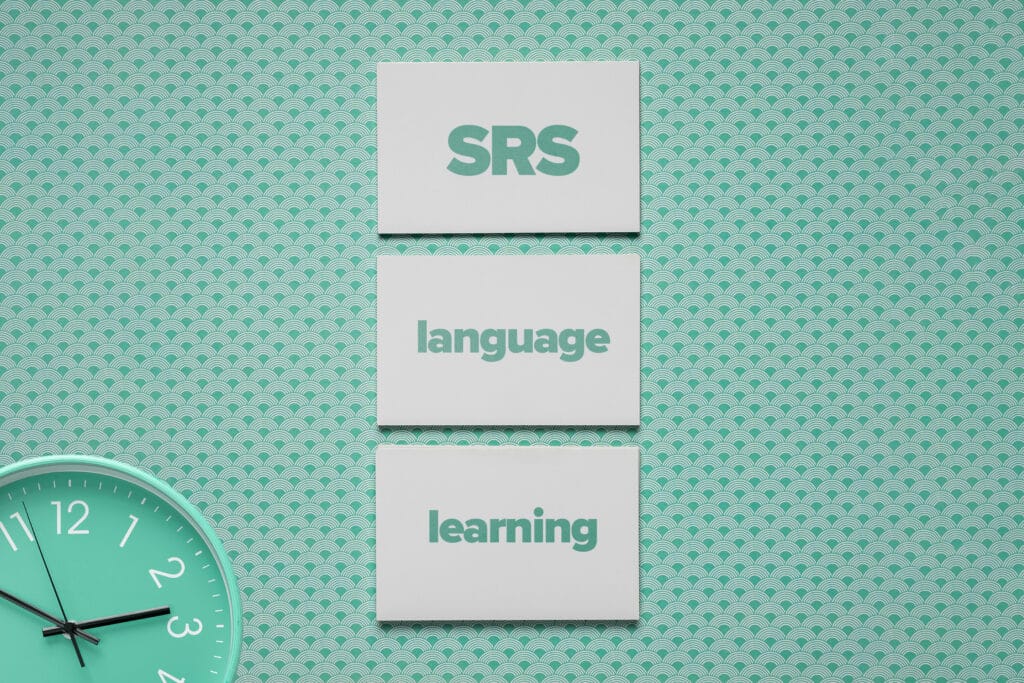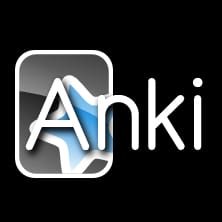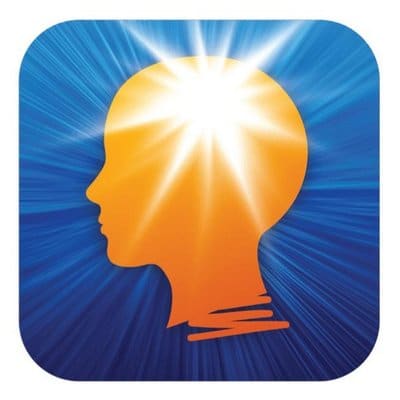
The Complete Guide to SRS Language Learning
Remember that time you crammed information for an exam?
While you may have performed well on the exam, how much of the studied information did you remember afterward?
If you’re like most humans, the answer is probably not very much.
Enter spaced repetition software (SRS).
Spaced repetition software shows you new words and phrases at optimally timed intervals so they get put in your long-term memory.
And in this blog post, you’ll learn everything you need to know about how it works and discover three SRS language learning software you can use.
Contents
- What Is Spaced Repetition Software (SRS)?
- How Does Spaced Repetition Software (SRS) Work?
- The Best SRS Language Learning Resources
- Why “Cramming” to Learn a Language Doesn’t Work
- If It’s So Ineffective, Why Do We Cram?
- Why Reviewing Your Flashcards Frequently Doesn’t Work
- And One More Thing...
Download: This blog post is available as a convenient and portable PDF that you can take anywhere. Click here to get a copy. (Download)
What Is Spaced Repetition Software (SRS)?
Spaced repetition software (SRS) are computer programs modeled after a process similar to using flashcards. Users enter items to be memorized into the program, which are then converted into electronic “decks” that appear on-screen in a one-by-one sequential pattern.
Usually, the user clicks one time to reveal the question or front of the generated card. A second click will reveal the answer or back of the flashcard. Upon seeing the answer, the user then indicates the difficulty of the card by telling the program how challenging it was.
Each following card’s order of appearance is not randomized. In fact, SRS programs use algorithms to space out the time intervals indicated when each card will appear again on the screen.
Cards given “easy” ratings will appear later than cards given “hard” ratings, thus allowing users to spend more time studying the cards that are more difficult. The tough ones will show up more often until they are mastered, letting you learn them more efficiently.
How Does Spaced Repetition Software (SRS) Work?
To put this into context, let’s pretend you spend an evening studying 100 Mandarin words you didn’t know before. You continue studying until you’ve completely memorized the words. Let’s say it takes you an hour to do this.
Immediately after reviewing these words, your memory of them will be quite high. However, over time you will naturally begin forgetting the material you learned.
And, since it was your first time learning these words, your use-it-or-lose-it brain is more likely to ditch this new material at a faster pace. The new knowledge isn’t yet considered important enough to be etched into your brain cells.
However, the second time you study the same words, it will take you less time to master the set than it did the first time. Perhaps this time it only takes you 30 minutes to memorize the 100 words. Congratulations! You’ve completed your first spaced repetition.
So, does this mean you’ll have to keep repeating the information you want to learn for the rest of your life? Not exactly. While it does require long-term review to keep information fresh in our minds, the time spent on review becomes shorter and less frequent over time.
With each successive review, it will take you less and less time to fully recall the information. As you begin mastering a set of words, you’ll find yourself whizzing through each card. Eventually, information will become so memorable that we know it by heart. This is when you know you’re ready to move onto a new, more challenging deck.
The Best SRS Language Learning Resources
Anki
Anki is one of the most popular spaced repetition software choices.
Named after the Japanese word for “memorization,” Anki allows users to create their own decks of cards or download pre-made decks by other users.
One popular feature of Anki is the ability to sync decks across multiple devices, allowing users to study online or on their cell phones. Anki also stores your statistics for each deck so that you can track your progress over time.
After you’ve flipped over a flashcard, Anki asks you to rank its difficulty. There are four choices: “Easy,” “Good,” “Hard” and “Again.” You’d choose the “again” option if you got the card wrong.
Based on the option you select, Anki determines when you’ll see the card next. For example, cards that you click “again” on will be shown a few minutes later. Whereas “Easy” cards won’t be seen until three days later (if it’s your first review session).
The more days you keep up with your flashcard reviews, the longer and longer you’ll go without seeing cards you’ve mastered. For example, some cards you won’t see again for two years if they’ve been in your revision cycle for half a year or more.
You can read our in-depth review and tutorial of Anki here:
https://www.fluentu.com/blog/anki-language-learning/
FluentU
FluentU teaches languages through authentic videos like music videos, movie trailers, news and inspiring talks.
The program has a very robust SRS system, allowing you to use interactive subtitles to click on any word, get a translation and turn it into a flashcard for later review. Each flashcard shows you an image, definition, grammar info, example sentences and even clips that show how words are used in different videos throughout the site.
You’re tested on vocabulary words using SRS-based quizzes, which also include multimedia as well as typing and speaking questions. This program can be used in the browser, but it can also be downloaded as an iOS or Android app.
SuperMemo
SuperMemo is another learning software that uses spaced repetition learning methods.
Electronic flashcards can be self-made, downloaded from a pre-made collection, or in some cases, merged together.
After users are presented with a card, they must respond and then give themselves a grade that reflects their recall ability. SuperMemo uses this feedback to calculate the interval length for the card to be repeated.
SuperMemo currently offers 24 languages and almost 300 courses. You can also create your own language courses if you want to use the software for vocabulary you’ve learned outside of SuperMemo.
Something unique about SuperMemo is its MemoChat, which is an AI chat bot that helps you practice words, phrases and grammar you’re learning on the app.
Why “Cramming” to Learn a Language Doesn’t Work
You can try, but unfortunately, you won’t get very far if you try to learn something like the Spanish subjunctive tense in one night. Now, you may wonder, if I was able to recall information so well at the time of an exam, why has it dropped from my memory soon after?
Well, there’s science behind this! Research proves that cramming intense amounts of information into our brain in a short period of time is not an effective way for long-term learning.
British author H.E. Gorst mentioned in his book “The Course of Education” that cramming is what “produce[s] mediocrity.” Yikes. What he means is that cramming doesn’t provide us with the ability to think critically and effectively apply our knowledge in creative ways.
Yet cramming is still becoming more and more popular among students of all ages.
If It’s So Ineffective, Why Do We Cram?
Fingers point to improper time management as the number one cause. If we better prioritize our time, we can more efficiently learn new information. By cramming, we may absorb information that can be easily regurgitated the following day. But say goodbye to that information because it’s going to disappear at an exponential rate as time goes on.
Cramming trades a strong memory now for a weak memory later. Unfortunately, we sometimes cling to short-term gratifications and fail to strive for long-term benefits.
In psychology, there is a theory of memorization and learning called the “spacing effect.” The spacing effect is the idea that we remember and learn items more effectively when they are studied a few times over a long span of time. And it’s what the SRS language learning method is based on.
Why Reviewing Your Flashcards Frequently Doesn’t Work
Since cramming is out the window, you may think it’s smarter to study material over and over again. It’s crucial to note that, while repetition is important, not all repetition is created equally. You’ll want to space out the repetitions between each time you study a set of information.
But determining how long to wait in between studying can also be a tricky matter. If you practice too soon, your brain will begin passively remembering information, which will not stick over time. If you practice too late, you will have forgotten the material and have to spend extra time relearning it. Add to this the complexity of individual learning and memorization patterns, and you have a recipe for guaranteed memory loss.
This is why spaced repetition software works so effectively.
Remember, while these programs may have wonderful language learning techniques, they won’t be effective unless you have the self-discipline to use them on an ongoing basis.
Make it a habit to open up and use the language learning apps mentioned above. If you set aside some time every day to do your SRS studying, you’ll see noticeable results sooner than you imagine.
Download: This blog post is available as a convenient and portable PDF that you can take anywhere. Click here to get a copy. (Download)
And One More Thing...
If you dig the idea of learning on your own time from the comfort of your smart device with real-life authentic language content, you'll love using FluentU.
With FluentU, you'll learn real languages—as they're spoken by native speakers. FluentU has a wide variety of videos as you can see here:
FluentU has interactive captions that let you tap on any word to see an image, definition, audio and useful examples. Now native language content is within reach with interactive transcripts.
Didn't catch something? Go back and listen again. Missed a word? Hover your mouse over the subtitles to instantly view definitions.
You can learn all the vocabulary in any video with FluentU's "learn mode." Swipe left or right to see more examples for the word you’re learning.
And FluentU always keeps track of vocabulary that you’re learning. It gives you extra practice with difficult words—and reminds you when it’s time to review what you’ve learned. You get a truly personalized experience.
Start using the FluentU website on your computer or tablet or, better yet, download the FluentU app from the iTunes or Google Play store. Click here to take advantage of our current sale! (Expires at the end of this month.)








